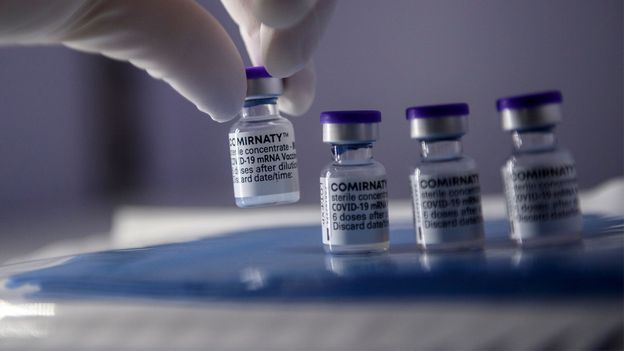
With that information a lab could make "a million doses of mRNA in a single 100ml test tube," says Blakney.
The US Food and Drug Administration approved the Pfizer-BioNTech Covid-19 vaccine on 11 December, 2020, making history as not only the first ever mRNA vaccine approved for humans but also as the first to have a 95% efficacy rate in clinical trials.
Kathryn Whitehead, an associate professor of chemical engineering and biomedical engineering at Carnegie Mellon University, and a key collaborator of Weissman and Karikó admits, "there weren't many people in the mRNA therapeutics world who would have imagined 95% initial efficacy rates in this emergency scenario"?
The pioneering work of Katalin Kariko and Drew Weissman on mRNA paved the way for the Pfizer and Moderna Covid-19 vaccines.If we are currently witnessing mRNA vaccine 1.0 for Covid-19, then 2.0 will address two further categories of disease, says Fu: "one is pathogens, like Sars, but you can apply this technology to other foreign invaders such as HIV.
"That is intriguing because it's verging beyond the very strict definition of a vaccine." Fu says the future could involve mRNA "treatments", for example to reduce inflammation.
Lipids have been described as the "unsung hero" – without lipid delivery being finally perfected and approved in 2018, there would have been no Covid-19 mRNA vaccines by 2020.
Before Covid-19, there were many research studies looking at broader applications of combining this new lipid delivery technique with mRNA Dong says, including genetic disorders, cancer immunotherapy, infectious diseases and bacterial infections.
Thanks to the combined breakthrough in lipid delivery and mRNA technology, vaccines and treatments in development include Translate Bio's mRNA therapy's for cystic fibrosis and multiple sclerosis; Gritstone Oncology and Gilead Sciences' mRNA vaccine for HIV; Arcturus Therapeutics' therapies for cystic fibrosis and heart disease; and German start-up Ethris, with AstraZeneca, are developing mRNA therapies for severe pulmonary diseases and asthma.Zika is one of many diseases that there may be an mRNA vaccine for in the future.The speed and cost of mRNA vaccines could change that paradigm and signal the end of neglected tropical diseases.
"We're most likely to see mRNA vaccines against influenza in the near future," says Whitehead.
Several pharmaceutical companies are also pursuing mRNA vaccines and treatments for cancer.From cancer to HIV, tropical diseases to antibiotic resistance, scientists believe there could be a huge arrange of mRNA vaccine solutions.Already Covid-19 mRNA vaccines lead some people to produce very high levels of antibodies, able to neutralise several variants of Covid-19 at once. .
There's also the potential to mix various mRNA vaccines together into a single health booster vaccine, which could ward off cancers and viruses at the same time.While it's just speculation at present, Fu says, "you could take a whole bunch of different flavours… a cocktail of mRNAs that make different proteins selective for your particular need." Both Moderna and Novavax already have combined Covid-19 and flu vaccines in development.
"There's good indication now that you do get a really good memory T cell response from the mRNA vaccines, but since these trials are a year and a half old in most cases, we're still understanding how long that immunity lasts for." She adds that most people, "don't really want to get multiple vaccines every year that knock you out for three days afterwards".
In a tortoise versus hare race, mRNA vaccines may have run ahead to combat Covid-19, but saRNA may win out in the end – and indeed has just received $195m (£145m) backing from AstraZeneca (which compares favourably to the $29.5m (£22m) Ethris received for its pulmonary diseases vaccine development, mentioned earlier in this article)